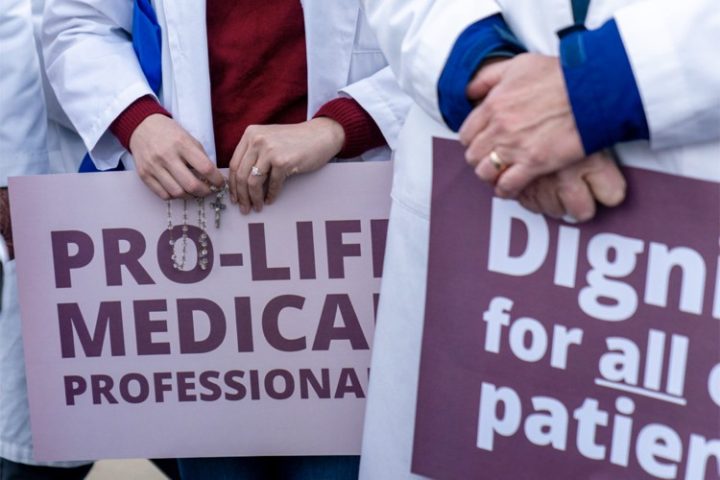
Following oral arguments in the abortion lightning-rod case Dobbs v. Jackson Women’s Health Organization at the Supreme Court last week, several Democrats thought they saw a ray of light for their cause in the midterms. If the high court rules next summer not only to uphold the Mississippi law banning abortions after 15 weeks but to overturn Roe v. Wade and its companion ruling Planned Parenthood v. Casey nearly two decades later as well, then, according to the Democratic narrative, there will be hell to pay.
Rep. Jackie Speier (D-Calif.) said that if the court overturns those rulings, “I think the country hasn’t seen the rage of women speaking out.” Rep. Pramila Jayapal (D-Wash.) said, “I think it’s going to mobilize people to go to the polls. You will see an outcry like you’ve never seen before.”
Rep. Ted Lieu (D-Calif.) tweeted: “If SCOTUS [Supreme Court of the United States] overrules Roe v. Wade for no reason other than the number of ultra-conservative justices has changed, the stench from such a naked political act will weaken the legitimacy of the Court and drive a blue wave next year.”
Senator Jeanne Shaheen (D-N.H.) challenged the high court:
I hope the Supreme Court is listening to the people of the United States because … I think … if you want to see a revolution, go ahead. Outlaw Roe v. Wade and see what the response is of the public, particularly young people.
Because I think that will not be acceptable to young women or young men.
They may be whistling in the dark: most voters rank the issue of the right to abortion in any list of priorities close to, if not at, the very bottom. Former Virginia Democrat Governor Terry McAuliffe learned that the hard way. Focusing his campaign for reelection against an unknown Republican, McAuliffe made abortion “rights” the centerpiece. In exit polling taken after he had lost to upstart Glenn Youngkin, it was learned that just eight percent of voters listed abortion rights as the most important issue facing Virginia.
Julie Roginsky, a Democratic political advisor to New Jersey’s Governor Phil Murphy (who himself suffered a near-death experience in his reelection bid), said that the abortion issue “hasn’t moved people to the polls in places like Virginia and New Jersey this year. It wasn’t an issue in either state.”
Voters, she said, were focused elsewhere, like inflation, the economy, and the cost of living:
I wish we lived in a world where outrage mattered. But I think we live in a post-outrage world, and voters today are affected only by that which directly affects them … [this] is why the economy, affordability and the cost of living are such major issues for so many people.
David Axelrod, Obama’s political consultant, agrees: “Can gutting Roe produce the kind of outpouring of women voters for Democrats [that] we saw in 2018, especially in the suburbs?” He answered his own question: “We’ve never seen abortion rights move large numbers of Democrats in national elections.”
In an Economist/YouGov poll last month, abortion was ranked at the bottom of voter concerns, behind taxes, government spending, health care, climate change, immigration, jobs, and the economy.
Even Megan McArdle, writing in the pro-abortion Washington Post, had to admit that even if the high court tosses Roe and Casey altogether next summer, there’s little chance that it would light a fire under those most affected: women. She wrote that Democrats are making two fatal assumptions: 1) that “women care more about abortion than men since we indisputably bear the burden of pregnancy,” and 2) that such a ruling therefore “would result in a fierce electoral backlash from women.”
In fact, she wrote, “there’s no real data to back up those assumptions.”
She need not worry. It’s likely that the Supreme Court, populated with six so-called “conservatives,” will whiff. Based on the oral arguments last week, observers present said there’s little chance the court will strike down the Mississippi law but likely will not seize the opportunity to attack the abortion issue at its core: that somewhere, somehow, buried deep in the recesses of the U.S. Constitution lies the right of a mother to murder her child in her womb.
That’s because next June the country will be in a throes of the midterm elections and Chief Justice John Roberts would just as soon find “a middle way” to avoid being charged with being political. As Judicial Crisis Network President Carrie Severina told Fox News, the court may back away from any attempt to redefine the standard states must now use when creating laws protecting the unborn in the future. Instead, the court is likely to send the whole issue back to a lower court after upholding the Mississippi law and let it sort out the details.
If this occurs, then the abortion issue will have little impact on the midterms next November and will remain unresolved until the high court decides to follow the Constitution. Then, the states will be free to decide the issue and leave the Supreme Court out of the matter altogether.
Related article:
“Conservative Republican Senators Urge SCOTUS to Overturn Roe v. Wade”



